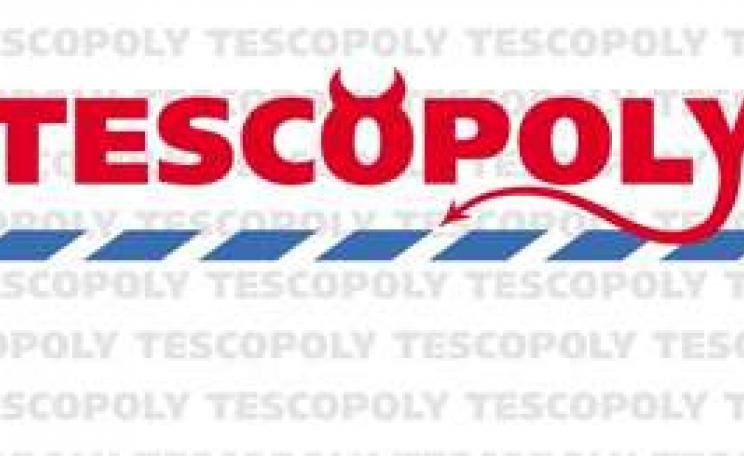Local opposition to the opening of a Tesco store was ignored by council planning officials
Local anti-supermarket campaigners in Bristol are currently engaged in taking a case against the opening of a Tesco store in the Stokes Croft area of the city to judicial review, but in the wake of the recent riots, there are lingering suspicions concerning underhand tactics and a possible smear campaign.
This issue recently became the subject of national attention following a riot outside the store on the evening of 21st April, 2011, during which the store was seriously damaged resulting in its temporary closure. The campaign group 'No To Tesco In Stokes Croft', has been working hard for over a year to stop Tesco’s intrusion into an area characterised by cultural diversity and small business, and yet, despite their efforts, say campaigners, Bristol City Council still saw fit to grant planning permission to the grocery multinational in the face of what seemed to be some pretty convincing arguments against it.
Tesco's underhand tactics?
It all started in February 2010 when an ‘inquisitive local’ discovered that workmen engaged on Cheltenham Road were preparing the former Jester’s Comedy Club building for use as a Tesco store. It has been claimed that Bristol City Council did not realise that the supermarket giant was behind the Change of Use application and there are allegations of deceit.
Tesco claim that the application was made by the company that owned the building, who, according to Head of Property & Communications Michael Kissman, wanted to 'make the building more marketable to future occupiers'. However, according to Elisabeth Winkler, from 'No To Tesco In Stokes Croft' campaign group, the use of third party organisations to make applications is a standard Tesco tactic. In the case of the Stokes Croft development it was to have an important effect on the subsequent planning application.
'Tesco has companies that do this for them' she says. 'They use third parties. The Traffic Impact Assessment relates to the third party so that when the councillors approved the change of use they thought that it was just a local shop. They didn’t realise it was Tesco.'
Overwhelming local opposition
On February 13th 2010 the campaign group organised a protest march along Cheltenham Road and this generated considerable interest. More than 2,500 people sent postcards to Bristol City Council expressing concerns about consultation and the group itself launched a survey of 500 local people to assess the strength of opinion in the community. The result was staggering, over 90 per cent stated that they felt a supermarket on Cheltenham Road would be bad for the area.
Michael Kissman disagrees. 'Clearly, before we open a store we conduct various forms of research to see if opening a store is viable. The ultimate test though is the numbers of people using the store. Once the store was open the evidence is that thousands of people used the shop'.
Nevertheless, this claim doesn’t impress Elisabeth Winkler. 'I’d like to know where they get their figures from' she says. 'They can afford to lose business you see, because they are so powerful. The nearby Gloucester Road store is practically empty.'
Kissman claims that local traders are supportive. However, if you talk to some of them, it soon becomes clear that feelings are mixed. The manager of the bike shop next door maintains that Tesco opening is a good thing for the area, but not everyone shares his opinion, even a member of his staff feels sad about it because of the effect on local business.
A few doors down, another local business owner feels that despite the apparent middle class nature of the campaign and the effect of the riots many local people feel that Tesco behaved deceptively. 'The main opinion was that Tesco used underhand tactics' he says. 'The council should insist that the planning application is resubmitted, that’s my opinion anyway'.
Further along Cheltenham Road, in the direction of the city centre, opinion is even more ambiguous. One trader believes, rather suspiciously, that Tesco helps to fund police training. Another is distinctly annoyed at Tesco’s intrusion into the area. 'There’s no need for it' she says. 'We have umpteen local shops around here, there’s a Sainsbury’s down the road, two other Tesco’s nearby. Why isn’t the council encouraging more local business?'
Police tactics and presssure
For local authorities throughout the UK, how to respond to a planning application by Tesco can be a complex and difficult issue. In 2006 Friends of the Earth released a report revealing that many local councils felt obliged to approve applications because of the huge costs involved should Tesco launch an appeal. Sometimes this can run into hundreds of thousands of pounds.
At Bristol City Council’s Development Control meeting, Councillor Alex Woodman expressed this exact fear and recommended approval of the application as a result, much to the horror of the campaign group. Michael Kissman however is adamant that Tesco, in most cases, work with local councils, despite the fact that he tentatively avoids the direct question of appeals.
'I think our best schemes are where we work with local authorities,' he insists. 'An example is Toxteth where we recruited one hundred local people who were previously long-term unemployed and we did this in partnership with the local council.'
There are stranger questions being asked in the community about the involvement of the local police. One hundred and sixty of them turned up on a Thursday night, on April 22nd, when the road where the Tesco store was situated is usually heavily populated with drinkers attending the local bars and clubs at the start of the Easter Weekend. Some of the officers were on horseback. Four had dogs and three of them were armed. Avon and Somerset Constabulary’s stated intention was to investigate the squatted house opposite the newly opened store as they had heard someone was intending to petrol bomb the premises.
Elisabeth’s colleague, Anita, thinks there is more to this story. 'The squatters who were originally there had built a good relationship with the local community,' she says. 'Suddenly they left and a new group of four squatters moved in. If there’s a small group of people why would you send in such a large number of police officers?'
Elisabeth herself is similarly suspicious, 'It looked to me like very bad policing. These things can very quickly turn nasty. There was a police van left empty in front of the Tesco and officers almost seemed to be herding them towards it. What was going on there I just do not understand. We know that elsewhere Tesco has built a police station, so what’s going on here?'
Avon and Somerset Constabulary have organised a series of public meetings to discuss tensions in the area following the riots. The Tesco store itself was left badly trashed during the disturbances and is yet to reopen, guarded by security. Local residents hope for alternatives.
'It’s bad for business in Bristol no matter which political configuration you belong to,' Anita says. 'What we’d like to see is more local food outlets in Bristol, a farmers market, not just Tesco. Something else needs to be presented as an alternative to giant grocery chains. There could be a lot of support for a new initiative'.
| READ MORE... | |
 |
HOW TO MAKE A DIFFERENCE How to stop a supermarket opening in your area Battling superstore monopolies needn’t be a lone crusade. Kate Eshelby looks at some of the resources available |
 |
SPECIAL CONTENT Life without supermarkets: community action is the best way to beat them A hypermarket victory in Hackney demonstrates how local groups can help protect community shops... |
 |
COMMENT Bring back real markets Tom Hodgkinson lays out the case for the return of street markets. Wouldn't we all be better off living outside the box? |
 |
COMMENT Climate Week is too cosy with EDF, RBS and Tesco - join an activist group instead Danny Chivers, author of the all-new No-Nonsense Guide to Climate Change, gives his verdict on the upcoming RBS-sponsored Climate Week |
 |
HOW TO MAKE A DIFFERENCE CASE STUDY: supporting local food A tireless crusader for rural revitalisation, Kate Eshelby meets the septuagenarian who beat Tesco out of town and is now at the heart of Suffolk’s local food revival |





